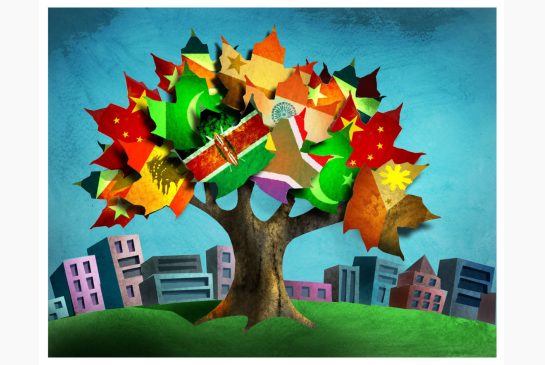RIcardo Hausmann writes: Many countries have substantial diasporas, but not many are proud of it. After all, people tend not to leave a country when it is doing well, so the diaspora is often a reminder of a country’s darker moments.
El Salvador, Nicaragua, and Cuba, to cite three examples, had more than 10% of their native population living abroad in 2010. And this figure does not take into account their descendants. The bulk of this migration happened at a time of civil war or revolution. In other places, massive outmigration occurred in the context of political change, as in Europe when communism collapsed.
The relationship between diasporas and their homelands often encompasses a broad palette of sentiments, including distrust, resentment, envy, and enmity.
One important connection is remittances, which add up to some $500 billion a year worldwide. The largest recipients are India, Mexico, and the Philippines. For countries such as Armenia, El Salvador, Haiti, Honduras, Jamaica, Kyrgyzstan, Lesotho, Moldova, Nepal, and Tajikistan, expatriates remit the equivalent of more than one-sixth of national income – an amount that often exceeds exports.
From the beginning of urban life, millennia ago, trade typically involved networks of co-ethnic merchants living among aliens. Greeks, Phoenicians, trans-Saharan traders, the Hanseatic League, Jews, Armenians, overseas Chinese, and the Dutch and British East India Companies organized much of world trade through such networks.
Co-ethnic networks’ durability and resilience throughout history reflects their ability to enforce contracts at long distances when the existing institutional framework could not do so reliably. They could establish trust between exporters and importers because they could punish opportunistic behaviors. For a tight-knit community, reputational costs and other forms of social punishment transcend geography: not paying for goods might mean not being able to marry your children well.
Legal institutions have since evolved to facilitate impersonal trade. Exporters and importers no longer need to know one another, because they can write a contract that a court will enforce.
This knowhow moves geographically in the brains of those who possess it and is transferred to others at work. That is why ethnic cuisines diffuse through diasporas, not cookbooks. And it may be why economies with more diverse sets of migrants perform better. Also, return migration is often an important source of new skills for a country.
Evidence of the importance of diasporas is everywhere, if you care to look. Franschhoek (French corner in Afrikaans) is a beautiful valley near Cape Town settled by Huguenots in the late seventeenth century. That is why, to this day, wines are made there.
Likewise, Joinville is a southern Brazilian city settled in the late nineteenth century by relatively uneducated Germans. Because of the cultural links they and their descendants have maintained with the mother country for more than 120 years, the city excels at advanced manufacturing of products that had not been invented when the migrants came. Morocco is full of French-language call centers that get their contracts through a cousin in Paris.
A country’s diaspora, and the diasporas it hosts, can be a huge asset for its development. Diasporas are not gusanos or worms, as Fidel Castro refers to Cubans abroad. They are a potential source of opportunities for trade, investment, innovation, and professional networks.
But a diaspora can work its economic magic only if the host country tolerates it and the home country appreciates it.

